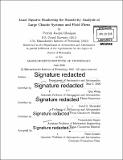Least Squares Shadowing for sensitivity analysis of large chaotic systems and fluid flows
Author(s)
Blonigan, Patrick Joseph
DownloadFull printable version (24.64Mb)
Alternative title
LSS for sensitivity analysis of large chaotic systems and fluid flows
Other Contributors
Massachusetts Institute of Technology. Department of Aeronautics and Astronautics.
Advisor
Qiqi Wang.
Terms of use
Metadata
Show full item recordAbstract
Computational methods for sensitivity analysis have proven to be incredibly useful to a wide range of engineers. Aerospace engineers have used these methods to optimize aerodynamic shapes and aircraft configurations, automatically adapt the computational mesh to reduce errors in Computational Fluid Dynamics (CFD) simulations, and to quantify uncertainties in these simulations. However, conventional sensitivity analysis methods, including the widely used adjoint method, break down when applied to long-time-averages of chaotic systems. This is problematic as many aerospace applications involve physical phenomena that exhibit chaotic dynamics, most notably high-resolution large eddy and direct numerical simulations of turbulent aerodynamic flows. Also, engineers are often interested in long-time-averaged quantities, such as the long-time-averaged lift of a flight vehicle. To efficiently apply design optimization, mesh adaptation, and uncertainty quantification to chaotic systems and high fidelity aerodynamic simulations, a new approach to sensitivity analysis is needed. A recently proposed method, Least Squares Shadowing (LSS) presents a promising alternative that avoids the break down encountered by conventional sensitivity analysis approaches. However, LSS has some issues, including high computational costs and a lack of robustness to certain errors. The following thesis will assess LSS for a fluid flow simulated by a large-scale CFD solver, then propose and investigate methods to increase the robustness and efficiency of LSS implementations.
Description
Thesis: Ph. D., Massachusetts Institute of Technology, Department of Aeronautics and Astronautics, 2016. Cataloged from PDF version of thesis. Includes bibliographical references (pages 235-243).
Date issued
2016Department
Massachusetts Institute of Technology. Department of Aeronautics and AstronauticsPublisher
Massachusetts Institute of Technology
Keywords
Aeronautics and Astronautics.